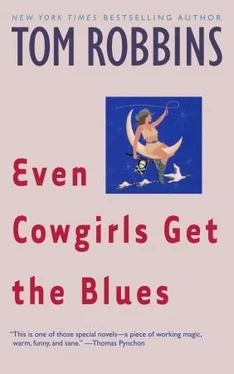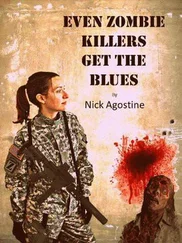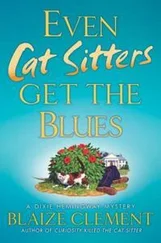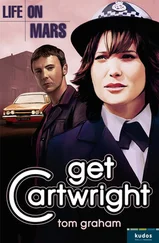“Although the manner in which we relate to pendulum time is often arbitrary, too,” threw in Dr. Robbins. He thought of the arbitrary dial of a clock and how certain arbitrary numbers on that dial, such as nine and five and noon and midnight have been left dog-eared by undue emphasis.
“Yes, I reckon so,” said Sissy. “But the point is, although a lot of our experience occurs outside of, or relates only artificially and tenuously to, pendulum time, we still envision time only in pendulum terms, in terms of continuous compulsory rotation. Even the Clock People's hourglass; it wasn't designed for perfect accuracy or anything, but it was modeled upon an orderly flow. It clung to the frayed edges of a time its builders wanted to transcend. The catfish pool came closer to measuring the 'other' time of life, but its limitations. .”
“Sissy.”
“Yes.”
Dr. Robbins had spotted Dr. Goldman at the French doors again. “What is the Chink's clockworks like?” he asked.
“Ha ha,” laughed Sissy. “Criminey. You wouldn't believe it. It's just a bunch of junk. Garbage can lids and old saucepans and lard tins and car fenders, all wired together way down in the middle of the Siwash cave. Every now and then, this contraption moves — a bat will fly into it, a rock will fall on it, an updraft will catch it, a wire will rust through, or it'll just move for no apparently logical reason — and one part of it will hit against another part. And it'll go bonk or poing and that bonk or that poing will echo throughout the caverns. It might go bonk or poing five times in a row. Then a pause; then one more time. After that, it might be silent for a day or two, maybe a month. Then the clock'll strike again, say twice. Following that there could be silence for an entire year — or just a minute or so. Then, POING! so loud you nearly jump out of your skin. And that's the way it goes. Striking freely, crazily, at odd intervals.”
Sissy closed her eyes, as if listening for the distant bonk or poing , and Dr. Robbins, ignoring Dr. Goldman's gestures from the French doors, seemed to be listening, too.
They listened. They heard.
They were assured then, together, the psychiatric intern and his patient, that there was a rhythm, a strange unnoted rhythm, that might or might not be beating out their lives for them. For each of us.
Because to measure time by the clockworks is to know that you are moving toward some end. . but at a pace far different from the one you might think!
66.
DR. ROBBINS HAD HAD ALL THE FOOD for thought he could stomach at one sitting. He wished to be home alone with another bottle of wine. He dismissed his patient politely. Then, in order to avoid Dr. Goldman, left the clinic by scrambling over the garden wall, tearing, in the process, a knee out of his thirty-dollar slacks.
Sissy Hankshaw Gitche , who never had talked so extensively before in her life, was weary and glad to be excused. Men of ideas, men such as Julian, the Chink and now Dr. Robbins, intrigued her. But she welcomed the chance to go to her room and dream of cowgirls, while, with a cube of unsalted kosher butter from the clinic dining room, she greased the creases in her thumbs.
Julian Gitche failed to visit or phone his wife upon that day in May. Julian had just contracted to paint a series of watercolors for a West German pharmaceutical house, the firm that once manufactured thalidomide. He was entertaining a representative of the firm and he feared that any whisper of his spouse's physical peculiarities might evoke for the former thalidomide salesman embarrassing memories.
The Chink hoofed into Mottburg that morning to purchase yams and a can of Chun King water chestnuts. His devotion to yams was unflagging, but he increasingly looked to the water chestnut as an example of endurance, of will and of fidelity to the particular. The water chestnut, after all, is the only vegetable whose texture doesn't change after freezing, changeth not after being cooked.
The Countess spent the day in his laboratory, laboring feverishly to develop an antipheromone. A pheromone is an air-borne hormone given off by the female animal, bird or insect to attract a male of her species. The human pheromone had only recently been isolated. The Countess hoped to produce and market a pill that, ingested periodically, would counteract human pheromone activity, eliminating all prurient odors from that part of the female anatomy the writer Richard Condon has so beautifully described as “the vertical smile.” (To Richard Condon, a dozen purple asters and a pound of goat cheese from Even Cowgirls Get the Blues .)
Bonanza Jellybean rode Lucas out to Siwash Lake to see if the whoopers were still there. They were! She celebrated by sticking a feather in her hat, though she'd be damned if she'd call it macaroni.
The author (who is also one of the above — which one doesn't matter) would like to take this opportunity, here at the conclusion of Sissy's remarkable account of Clock People and clockworks, to advance an earthquake theory of his own. As the author sees it, the Earth is God's pinball machine and each quake, tidal wave, flash flood and volcanic eruption is the result of a TILT that occurs when God, cheating, tries to win free games.
67.
THE FOLLOWING MORNING, Dr. Robbins sent for Sissy early, before Dr. Goldman had a chance to get at her. Again he escorted her into the little walled garden, although this time without a bottle of wine. As a matter of fact, Dr. Robbins's blue eyes were being squashed by about a hundred pounds of hangover.
“Okay,” he said softly, wishing not to agitate the punitive and vindictive deities of fermentation, “tell me how you met the Chink.”
“I met him at the can-dee sto-ore,” sang Sissy. “No, seriously. I'm thankful to have an opportunity to talk to someone safe — trustworthy, you know — about the Chink, but aren't you supposed to be asking me about. . about the reasons I'm in this institution?”
“I haven't the slightest interest in your personal problems,” snapped Dr. Robbins, inwardly cursing the chemical Calvinism that causes alcohol to make us suffer for the good times it gives us.
“Oh? Well, my husband is spending quite a sum of money to have my personal problems aired at this clinic.”
“Your husband is a fool. As for you, if you let yourself be subjected to the indignities of psychoanalysis, you're a fool as well. And Goldman is certainly a fool for sending you to me. I , however, am no fool. You've told me some of the most fascinating stories I've heard in a long while. I'm sure as hell not going to waste these sunny hours among the flowers listening to your dreary personal problems when I could be hearing more about your adventures with the Chink. Now. Tell me how you met him. And don't hesitate to, uh, to perform the, er, the antics you do with your thumbs. If you'd like.”
“But won't that attract attention?” Without the wine to encourage her, Sissy was hesitant to repeat the digital abandon of the day before.
“Sometimes,” said Dr. Robbins, glancing with bloodshot peepers at the French doors, “sometimes those things that attract the most attention to us are the things that afford us the greatest privacy.” He flopped in the grass.
“Doctor,” said Sissy with a smile, “forgive me but I get the impression that you're a bit of a mental case yourself.”
“It takes one to know one,” replied Robbins. “That's probably why all the penguins ended up at the South Pole.”
68.
PART BADLANDS BUTTE, part grasslands hill, part high chaparral, Siwash Ridge is a geological mutant, a schizophrenic formation embodying in one relatively small mountain several of the most prominent features of the American West. A willy twisting and unpredictable trail zigs and zags up its eastern side, through thickets of scrub oak and juniper, upward over grassy bumps, finally clinging by its shoelaces to limestone walls. The top of Siwash, though disposed in a few places to jut and peak, is very nearly flat: a calcium carbonate aircraft carrier, a ship that water built from land.
Читать дальше












